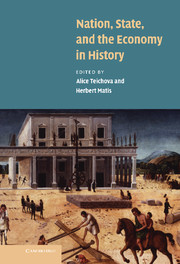Book contents
- Frontmatter
- Contents
- List of figures
- List of tables
- List of contributors
- Acknowledgements
- Introduction
- PART I
- PART II
- 7 The state and economic development in Central and Eastern Europe
- 8 Concepts of economic integration in Austria during the twentieth century
- 9 The economy and the rise and fall of a small multinational state: Czechoslovakia, 1918–1992
- 10 Economic retardation, peasant farming and the nation-state in the Balkans: Serbia, 1815–1912 and 1991–1999
- 11 National and non-national dimensions of economic development in nineteenth- and twentieth-century Russia
- PART III
- PART IV
- PART V
- Index
11 - National and non-national dimensions of economic development in nineteenth- and twentieth-century Russia
Published online by Cambridge University Press: 07 September 2009
- Frontmatter
- Contents
- List of figures
- List of tables
- List of contributors
- Acknowledgements
- Introduction
- PART I
- PART II
- 7 The state and economic development in Central and Eastern Europe
- 8 Concepts of economic integration in Austria during the twentieth century
- 9 The economy and the rise and fall of a small multinational state: Czechoslovakia, 1918–1992
- 10 Economic retardation, peasant farming and the nation-state in the Balkans: Serbia, 1815–1912 and 1991–1999
- 11 National and non-national dimensions of economic development in nineteenth- and twentieth-century Russia
- PART III
- PART IV
- PART V
- Index
Summary
INTRODUCTION
This chapter examines the interaction of state and ‘nation’ in the Russian empire and the Soviet Union over the course of two centuries of economic development. It addresses a series of related questions. Given that the doctrine of nationalism assumed major significance in much of Europe and the wider world after the French Revolution, to what extent did it influence economic change in nineteenth- and twentieth-century Russia and the Soviet Union? Alternatively, did non-national or supra-national factors loom larger in the considerations that governed policy-makers in the tsarist empire and the USSR? What impact did state-led economic programmes and policies have on incipient nationalism, amongst non-Russians as well as Russians? Finally, to what extent and how did ‘national’ ambitions – couched in terms of economic advantage or disadvantage – contribute to the collapse of these political systems?
Economic historians need to engage more than they have hitherto in a dialogue with historians and theorists of nationalism, nation-state formation and national identity. Some elements of the conversation may readily be constructed. The very stuff of much economic history is the scrutiny of economic projects advanced within the framework of the modern nation-state. How did the nation-state come to have ‘such a great influence on economic development’ in nineteenth-century Europe? Without doubt this question has produced much high-quality work on important aspects of the formulation and impact of government economic policy, as well as on the social and political consequences of economic change in continental Europe.
- Type
- Chapter
- Information
- Nation, State and the Economy in History , pp. 219 - 236Publisher: Cambridge University PressPrint publication year: 2003
- 1
- Cited by



